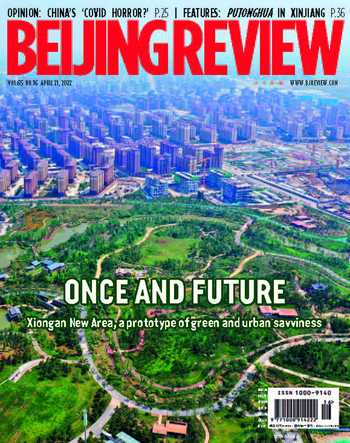Beijing Bop
2022-04-21ByElsbethvanParidon
By Elsbeth van Paridon
‘I’m not sure what you mean by indie,” Matteo, the Sardinian bass player of Beijing-based trashcore punk band Deprive, told this musically illiterate author. “To me, there are two main definitions. First, indie as in independent, which could encompass any music genre, any artist or musician not signed to major or big labels. Second, indie as in that genre that puts on the alternative mask but what it really aspires to is airtime.” And so, adhering to the first definition and accompanied by a sneering score of grungy guitar riffs, a voyage into the belly of the beast unfolds: Time to hit those Beijing underground notes.
Much like a riff, a pattern of notes repeated throughout a musical piece, yours truly over the years has had the impromptu brush with Beijing’s underground music scene. Take Paradiso, a true temple of live music in Amsterdam, capital of the Netherlands. The year was 2005; the author was a Sinology student; the song was Yinwei, Suoyi (literally “because, therefore”). Heavy guitar slashes and sharp blasts from a suona, a type of Chinese horn, penetrated the air and eardrums alike. One of the biggest Beijing bands at the time, Second Hand Rose(Ershou Meigui) brought a distinct mix of full-bodied rock ‘n roll, prime punk and traditional Chinese instrumentation such as the suona, dating back to the Han Dynasty (202 B.C.–A.D. 220), to the scene. The band reveled in taboos like innuendo-laced lyrics and genderbending costumes with a hint of Peking Opera, embracing all the contradictions of being a modern Chinese artist; they floated in the twilight zone between their underground roots and the mainstream madding crowds. The Amsterdam audience devoured their performance with ravenous gusto and asked for seconds.
Fast forward to the Roaring Twenties 2.0 and the band’s old stomping (under) ground of Beijing, aka China’s political powerhouse. The alternative scene in 2022: Did it stay or did it go?
One question will have many scratching their heads. Beijing, capital of China, and underground culture: contradictio in terminis or match made in Heaven?

This particular aspect of Beijing’s urban scenery has been heralded as an epicenter of creativity in China: You can find everything, from dark noise to grunge, rock, hip-hop and avant-garde jazz. “I don’t see it as a contradiction; quite the opposite,” Matteo continued, “There’s an underground scene in almost every big city around the world, be it punk, metal, noise, rap, psytrance, whatnot… The ‘underground’ is that figurative place where bands or individuals are free to express their art without external restrictions on content of lyrics, image or labels.”
Eric de Fontenay is an “adopted”Beijinger from New York, the U.S., and founder of MusicDish*China. Aside from touring Chinese and other international bands around the globe and bringing outside bands into China, his indie music brand serves as a window into the more alternative, youth-oriented culture of the Chinese music scene and industry.“Underground culture is always the grassroots; it’s the developing, the building, the testing, the innovating. That’s Beijing,” he told Beijing Review. “This culture isn’t just present in the capital, it thrives here. And the ingenuity radiates across the country.”
American Rochelle Beiersdorfer is a lifelong music maniac, writer and active supporter of China’s independent music scenes. Mostly involved in the Beijing heavy metal and punk rock communities, this aficionada works in the shadows of the underground and can definitely shine some light on its raw energy.
“I would say music is a sonic solace and a snapshot of an age. We all have the music of our youth, and that’s often what we stay with,” Beiersdorfer said, “If you ask anyone what made the ground fertile for, e.g., metal in China, it was Beijing’s Tang Dynasty—the first heavy metal band [in China]—headed by musicianturned-writer Kaiser Kuo in the late 1980s. Today, newfangled millennial and Gen Z tunes with altered tones are popping up across the capital, ushering in a new era for Beijing’s indie scene and China’s audial urban landscape by large.”
Deprive guitarist Jarrod, also your humble guide to gumbo courtesy of his Louisiana roots, chimed in, “As long as there are people who enjoy underground music, there will be underground music. There are too many good bands in Beijing alone, not to mention all the great acts nationwide. It’s wild to think that across China, the local scenes have their ‘hometown’ favorites and they always bring the crazy cool to the stage; whenever, wherever. If you’re in Beijing, go see Xiao Wang or Never Before or any project that involves Dann Gaymer. If you’re in Qingdao[Shandong Province], go see Dummy Toys or Demerit. And so this list jams on…”
The late 1980s and early 1990s saw the dakou phenomenon, i.e., tapes and CDs that were cut from U.S. record company catalogs and shipped to China to be trashed.
“The products were then sold on the streets of China’s cities for a nickel and a nail, becoming a spring for many popular forms of music and rock to flourish in China,”Beiersdorfer added, “Whenever many of my friends who now work in China’s music industry tell me how they first were exposed to Western forms of music as teenagers and how they found their passion, they will say‘dakou.’” One man’s trash is another man’s treasure; that one really rings true here.
However ominous the underground’s subtexts at times—debauched, brash, and coarse—the “community feel” is in fact another riff running throughout its modern-day musical scores.
“What I really think separates the punk scene from all other scenes… is that everyone is so supportive,” Jarrod said. “Yes, there are mosh pits at shows. No, you won’t get trampled or kicked if you fall. Someone will be there to help you up when you’re down.”

“Like any form of art—be it painting, dance, or fashion—music is a medium of expression and involves creators and listeners alike. Beijing’s underground devotees really are there for the music,”Beiersdorfer continued. “I do also believe having this type of scene in a political center represents on the broader, social level, a useful, creative and open-minded questioning of the status quo.”
Hip-hop has risen to the surface and spilled over into your average Chinese firsttier street scenery. Punk, indie and metal: not so much. Yet China’s alternative scene doesn’t appear to be a response to the bloated nature of the crafted and contoured mainstream hip-hop or C-slash K-pop slickness, but more a sense of freedom people find in being under the radar. So will the louder genres ever rise to the surface or do they come with one too many lingering negative associations?
“It used to be a stage to vent and speak freely of what one thought of socio-politico issues. I think this might be coming back with some of the new bands,” Matteo replied. “Punk and heavy music in general thrive whilst hovering under the surface. Coming up for ‘airtime’ would mean compromising: a more accessible sound, more accessible content, bending to music industry trends.”
De Fontenay echoed these musings, “iQiyi’s 2019 The Summer of Bands reality show was a game changer for the scene, giving Chinese indie bands a new platform to make their music heard. But when indie music gets more mainstream, it may bend to the will of new audiences.”
Jarrod, too, tuned into the budding composition. “There is this glass ceiling that exists for punk, metal, powerviolence—real, by first definition, indie bands. Many get signed, but you will hardly ever hear their harsh sounds or extremely rebellious lyrics on the radio almost anywhere. It’s just not the thing to air,” he said.
Trashed CDs to trashcore, Beijing’s underground music really isn’t about the tune; it’s about the ‘tude. BR
